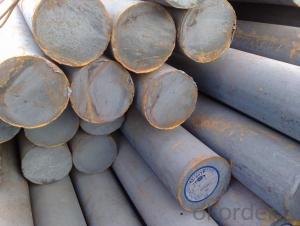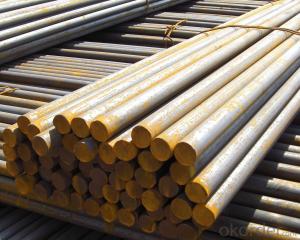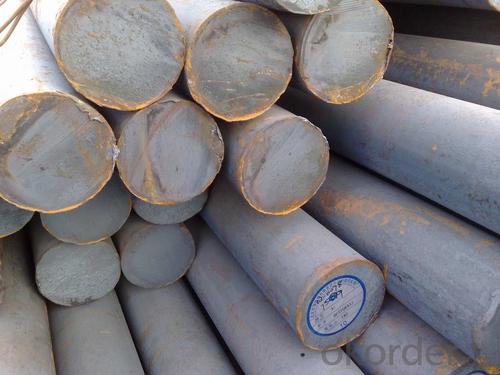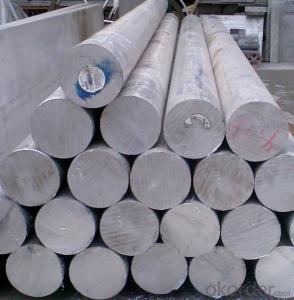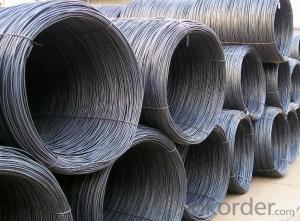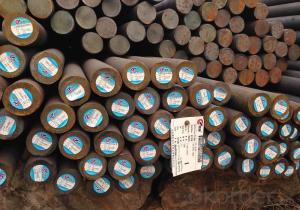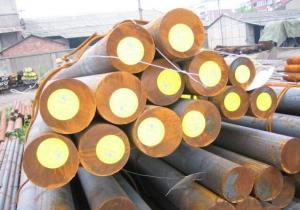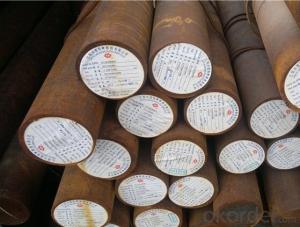Special Steel AISI 5140 Mild Carbon Steel
- Loading Port:
- China main port
- Payment Terms:
- TT or LC
- Min Order Qty:
- 25 m.t.
- Supply Capability:
- 10000 m.t./month
OKorder Service Pledge
OKorder Financial Service
You Might Also Like
Specification
The details of our Steel
1. Produce Standard: as the GB, AISI, ASTM, SAE, EN, BS, DIN, JIS Industry Standard
2. Produce processes: Smelt Iron -EAF smelt Billet - ESR smelt Billet -Hot rolled or forged get the steel round bar and plate
3. Heat treatment:
Normalized / Annealed / Quenched+Tempered
4. Quality assurance:
All order we can received Third party inspection, You can let SGS, BV,.. and others test company test and inspect our products before Goods shipping.
Product information
Chemical Composition(GB)%
C | Si | Mn | Cr | Ni |
0.37-0.44 | 0.17-0.37 | 0.50-0.80 | 0.80-1.10 | ≤0.30 |
Heat Treatment
Item | Temperature ℃ | Hardness |
Normalizing | 850-870 | 179-229HB |
Characterstics: Which has the best comprehensive mechanical properties
Applications
1.Can be used for drawing die and plastic mould | |||
2.Can be used for middle and small punch |
Main product
Plastic Mould Steel
DIN 1.2311,1.2738,1.2083,1.2316 etc.
AISI P20,P20+Ni,420 etc.
JIS SUS420J2
Hot Work Steel
DIN 1.2344,1.2343,1.2367,1.2365,1.2581,1.2713 etc.
AISI H13,H11,H10,H21, etc.
JIS SKD61,SKD6,SKD5,SKT4 etc.
Cold Work Steel
DIN 1.2739, 1.2601, 1.2080, 1.2436, 1.2631, 1.263, 1.2510, 1.2327 etc.
AISI D2, D5, D3, D6, A8, A2, O1 etc.
JIS SKD10, SKD11, SKD1, SKS3 etc.
High Speed Steel
DIN 1.3343, 1.3243, 1.3247, 1.3355 etc.
AISI M2, M35, M42, T1 etc.
JIS SKH51, SKH35, SKH59, SKH2 etc.
Alloy Structural Steel
DIN 1.7035,1.6511,1.7220,1.7225 etc.
AISI 5140, 4340, 4135, 4140 etc.
JIS SCr440,SNCM439,SCM435,SCM440 etc.
Stainless & Carbon Steel or Others
DIN 1.4125,1.1191 etc
AISI 440C,1045, 1020 etc.
JIS SUS440C,S45C etc
Product show

Workshop show

- Q: How does special steel perform in cryogenic fatigue resistance?
- Special steel is known for its exceptional performance in cryogenic fatigue resistance. Cryogenic fatigue refers to the deterioration of a material's structural integrity under repeated loading and unloading at extremely low temperatures. Special steel, also known as high-performance or high-strength steel, exhibits superior resistance to cryogenic fatigue compared to conventional steels. The unique composition and microstructure of special steel contribute to its enhanced cryogenic fatigue resistance. Special steels are typically alloyed with elements such as nickel, chromium, and molybdenum, which improve their mechanical properties, including strength and toughness, even at low temperatures. These alloying elements enable the steel to maintain its integrity and resist crack initiation and propagation, which are common failure mechanisms in cryogenic environments. Furthermore, the microstructure of special steel is carefully controlled during the manufacturing process to ensure optimal performance in cryogenic conditions. The fine-grained structure of special steel reduces the susceptibility to fatigue cracks, as it provides a more uniform distribution of stress and strain throughout the material. This helps prevent the formation of localized stress concentrations, which can lead to crack initiation and subsequent failure. In addition to its composition and microstructure, special steel undergoes rigorous testing and quality control measures to ensure its cryogenic fatigue resistance. Various industry standards and specifications exist to evaluate the performance of special steel in cryogenic conditions, such as the ASTM E466 test method. These tests simulate the cyclic loading and unloading that the material may experience in cryogenic environments and provide valuable data on its fatigue life and durability. Overall, special steel demonstrates excellent cryogenic fatigue resistance due to its unique composition, controlled microstructure, and rigorous testing. Its ability to withstand repeated loading and unloading at extremely low temperatures makes it a preferred choice for applications in industries such as aerospace, energy, and cryogenic storage.
- Q: Can special steel be used in the sporting goods manufacturing industry?
- Yes, special steel can be used in the sporting goods manufacturing industry. Special steel, with its unique properties such as high strength, durability, and corrosion resistance, can be utilized for producing various sporting goods like golf clubs, tennis rackets, bike frames, and baseball bats. These steels can enhance performance, improve longevity, and provide better control and accuracy in sports equipment.
- Q: What is the difference between general steel and special steel?
- Pu steel: full name ordinary steel, mostly with plates, profiles and wire form. Ordinary steel is the basic material of the earliest, the largest amount of use in industry, widely used in architectural structure, bridge components, hull structure, transportation, machinery manufacturing, agriculture, textile, defense industry, metal products, food industry, household appliances and other various departments of the national economy.
- Q: How does special steel contribute to the toughness of products?
- There are several ways in which special steel enhances the toughness of products. Firstly, its high strength and durability are well-known. Specific alloying elements and heat treatment processes are used in its manufacturing, which improve its mechanical properties and make it more resistant to wear and tear. As a result, products made from special steel can withstand heavy loads, impacts, and harsh environments, making them tougher and less prone to breakage. Moreover, special steel possesses excellent corrosion resistance properties. This is achieved by adding specific alloying elements like chromium and nickel, which create a protective layer on the steel's surface, preventing rust and corrosion. The ability to resist corrosion adds to the toughness of the products since they can be used in corrosive environments without experiencing degradation or loss of performance. Furthermore, special steel offers enhanced heat resistance. It can endure high temperatures without compromising its structural integrity or mechanical properties. This is particularly valuable in industries such as aerospace, automotive, and energy, where components are subjected to extreme temperatures. The capacity of special steel to maintain toughness under high heat conditions contributes to the overall reliability and longevity of the products. Additionally, special steel can be customized to meet specific requirements. Manufacturers can tailor the composition and properties of the steel according to the intended application. For instance, various types of special steel alloys are utilized in the production of cutting tools, bearings, and structural components. By selecting the appropriate grade of special steel, manufacturers can optimize the toughness of their products, ensuring they can withstand the intended use and perform reliably. In conclusion, special steel enhances the toughness of products through its high strength, corrosion resistance, heat resistance, and customizability. The distinctive properties of special steel make it an ideal choice for a wide range of applications where toughness and durability are essential factors.
- Q: How does special steel perform in high-velocity impact conditions?
- Special steel is specifically designed to perform well in high-velocity impact conditions. It possesses exceptional strength and toughness, allowing it to withstand the intense forces exerted during such impacts. The unique composition and heat treatment of special steel enable it to absorb and distribute the energy generated by the impact, minimizing deformation and potential damage. Overall, special steel demonstrates excellent performance and reliability in high-velocity impact conditions.
- Q: How does special steel contribute to the aerospace material cost reduction?
- Special steel contributes to the aerospace material cost reduction by offering superior strength, durability, and corrosion resistance properties. This allows for the design and manufacture of lighter and more fuel-efficient aircraft components. Additionally, special steel's high performance characteristics enable longer service life, reducing maintenance and replacement costs over time.
- Q: What are the main characteristics of magnetic steel forgings?
- The main characteristics of magnetic steel forgings are high strength, excellent wear resistance, and good magnetic properties. These forgings are known for their durability and ability to withstand extreme conditions. They also have good machinability and can be easily formed into various shapes.
- Q: What is the cost of special steel compared to other materials?
- The cost of special steel compared to other materials can vary depending on a range of factors. Special steel, also known as alloy steel or tool steel, is typically more expensive than regular carbon steel due to its enhanced properties and composition. Its high strength, durability, and resistance to wear and corrosion make it suitable for specialized applications in industries such as automotive, aerospace, and construction. Compared to non-ferrous metals like aluminum or copper, special steel often comes at a lower cost. However, it is important to consider that different types of special steel can have varying price points. For instance, stainless steel, which contains chromium and other elements for enhanced corrosion resistance, tends to be more expensive than carbon steel. When comparing the cost of special steel with other materials such as plastics or composites, it is crucial to evaluate the specific requirements of the project. While these alternatives might have lower initial costs, they may not possess the same level of strength, heat resistance, or durability as special steel. Therefore, the long-term benefits and savings provided by special steel, such as reduced maintenance, longer lifespan, and improved performance, should also be taken into account. Ultimately, the cost of special steel compared to other materials is influenced by factors like the type and grade of steel, market demand, quantity needed, and any additional processing or finishing required. Consulting with suppliers, considering the specific application requirements, and conducting a thorough cost-benefit analysis will help determine the most suitable and cost-effective material choice for a particular project.
- Q: What are the different methods of surface tumbling for special steel?
- Special steel can be surface tumbled using various methods, including barrel tumbling, vibratory tumbling, and centrifugal tumbling. To achieve a smooth and polished surface finish, barrel tumbling is commonly employed. This method involves placing the steel parts in a rotating barrel with abrasive media. As the barrel rotates, the steel parts tumble and come into contact with the abrasive media, effectively eliminating burrs, sharp edges, and surface imperfections. Vibratory tumbling, on the other hand, utilizes a vibrating container for surface tumbling special steel. The steel parts are placed in this container along with abrasive media. The vibration causes the steel parts to move and interact with the abrasive media, resulting in the removal of surface imperfections. Vibratory tumbling is often chosen for delicate or complex-shaped steel parts due to its gentler action compared to barrel tumbling. For precise control over the tumbling process, centrifugal tumbling is a specialized method that employs centrifugal force. Steel parts are positioned inside a rotating drum, which is then spun at high speed. The centrifugal force propels the steel parts to move and come into contact with the abrasive media, resulting in the elimination of surface imperfections. Centrifugal tumbling is particularly suitable for smaller or intricate steel parts. In summary, these different methods of surface tumbling offer diverse options for achieving the desired surface finish for special steel. The selection of a method depends on factors such as the size, shape, and delicacy of the steel parts, as well as the desired level of surface finish.
- Q: How does special steel contribute to the formability of products?
- Special steel, also known as alloy steel, plays a crucial role in enhancing the formability of products. The unique properties and composition of special steel make it an ideal choice for various industries, including automotive, aerospace, and construction. One of the key ways in which special steel contributes to the formability of products is through its exceptional strength and durability. Special steel is engineered to have a higher tensile strength compared to regular steel, which allows it to undergo significant deformation without breaking or cracking. This property enables manufacturers to shape and mold the steel into complex and intricate designs, resulting in products with enhanced formability. Additionally, special steel offers excellent resistance to deformation, known as elastic deformation. This means that even after undergoing significant stress or strain, the steel can return to its original shape, reducing the risk of permanent deformation. This characteristic is especially beneficial in applications where products need to withstand repeated bending or shaping without losing their structural integrity. Moreover, special steel often contains specific alloying elements such as chromium, nickel, or molybdenum, which further improve its formability. These alloying elements enhance the steel's ability to be easily formed and manipulated, making it more ductile and reducing the risk of cracking during the forming process. Furthermore, special steel can be heat-treated to modify its mechanical properties and enhance its formability. Through various heat treatment processes such as annealing or quenching, the steel can be made more malleable, allowing it to be easily shaped and formed into desired products. Overall, special steel plays a crucial role in improving the formability of products due to its exceptional strength, resistance to deformation, alloying elements, and heat-treatability. These properties enable manufacturers to create products with intricate designs and complex shapes, meeting the diverse needs of different industries while ensuring durability and structural integrity.
Send your message to us
Special Steel AISI 5140 Mild Carbon Steel
- Loading Port:
- China main port
- Payment Terms:
- TT or LC
- Min Order Qty:
- 25 m.t.
- Supply Capability:
- 10000 m.t./month
OKorder Service Pledge
OKorder Financial Service
Similar products
Hot products
Hot Searches
Related keywords
